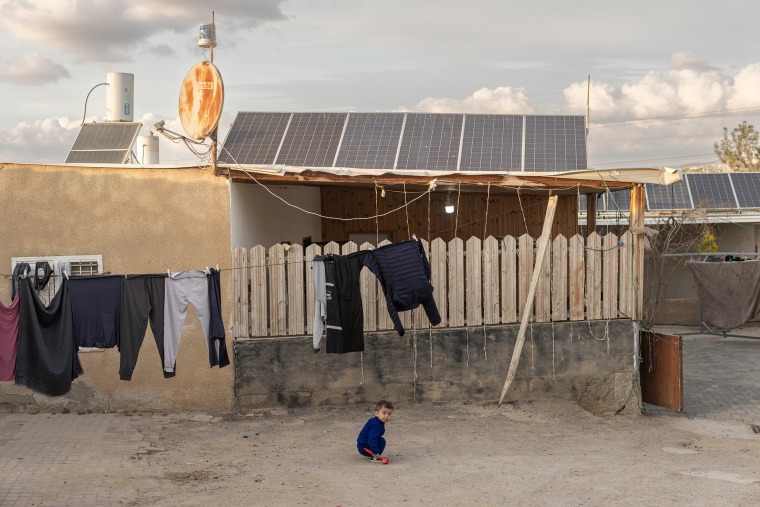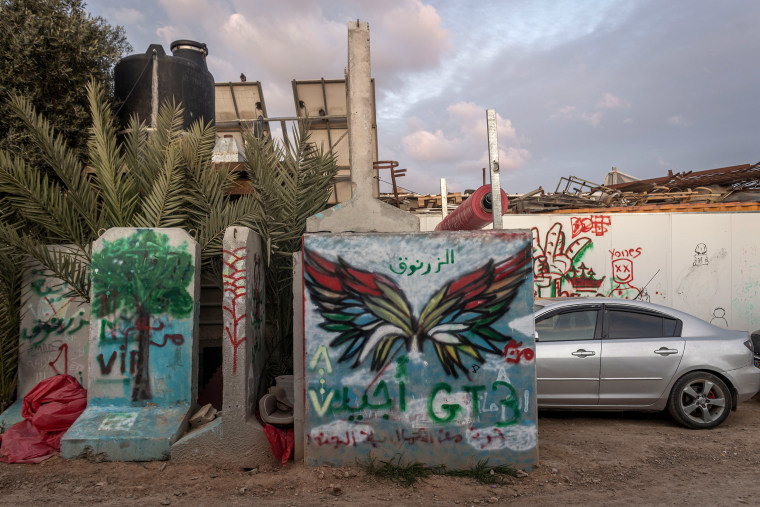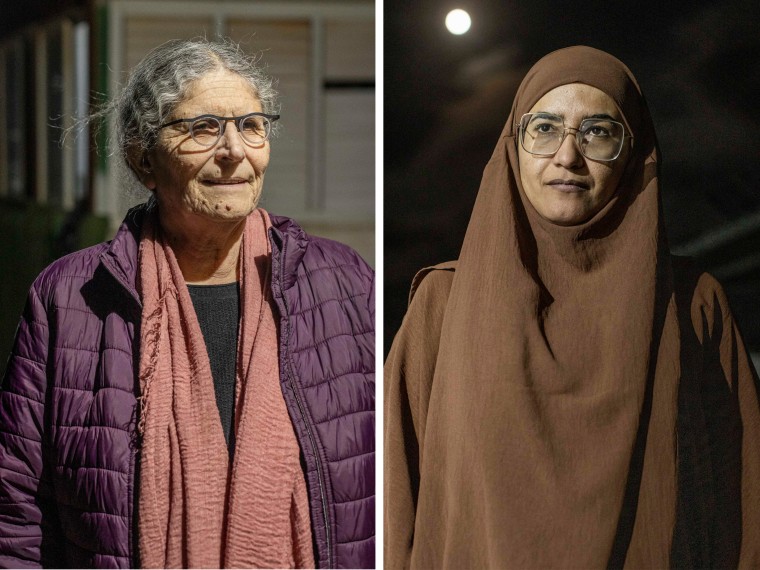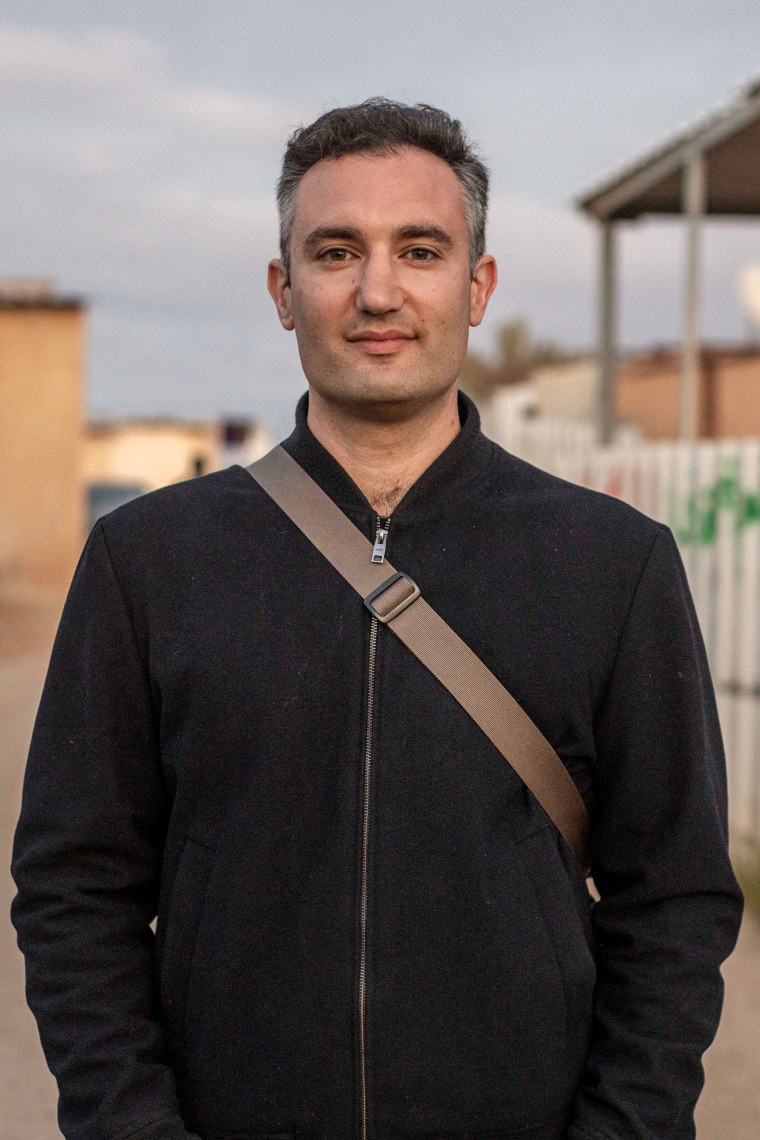At a Ramadan meal, Palestinian Bedouin invite Jewish Israelis to the table
Abu Qwaider’s village, az-Zarnūg is one of at least 35 unrecognized villages in the Negev, Sarab Abu-Rabia-Queder, a prominent sociologist who is also Bedouin and whose husband is from az-Zarnūg, told NBC News in a phone interview Sunday.
And in the midst of the Israel-Hamas war, Abu Qwaider said dozens of homes in the village, including two of his brothers’ homes, have been demolished by Israeli officials so far this year, the latest in what they see as unfair or unjust treatment of Bedouins. His brother was recently released from prison; he was accused of spying for Hamas and involvement in a possible plan for an attack, allegations his family strongly denies.
Bedouin families in unrecognized villages also face a lack of access to basic public services to varying degrees, like electricity. Families rely on solar panels and the odd generator for power, making the bitter chill of winter and scorching heat of summer difficult to bear. They aren’t consistently provided with bomb shelters, which are dotted across much of the rest of Israel. After Hamas’ Oct. 7 attacks — in which Bedouin were among the 1,200 killed and more than 250 taken hostage into Gaza — the Bedouin of az-Zarnūg had a shelter constructed in their community by a nonprofit group.


In addition to barriers enforced by Israeli officials, the Bedouin have faced scrutiny and criticism from members of the Palestinian community due to the willing participation of some in the Israeli military and border police.
Military service is not mandatory for members of Bedouin tribes, but as of February, more than 1,500 Bedouin were serving in the Israel Defense Forces, according to reporting from Israeli newspaper The Jerusalem Post. The IDF told NBC News it was not able to provide data on how many Bedouin are currently actively serving. It was not clear how many Bedouin currently serve with the Israeli border police.
Abu-Rabia-Queder stressed that the Bedouin serving with Israeli forces represent a minority of the population, and the chance to overcome poverty and other social barriers could contribute to why some chose to join the military, though more research needs to be done, she said.
Many Bedouin who served with the IDF lived in the northern Galilee region, but some Negev Bedouin have also served, said Huda Abu Obaid, a member of the Negev Coexistence Forum.
Abu Qwaider understands why other Palestinians chafe at this. “They’re a partner in occupation,” he said.

For the Jewish Israelis of the Negev Coexistence Forum like Haia Noach, 71, reaching across to the Bedouin requires acknowledging the violence Israelis and the Israeli state have inflicted on them. She co-founded the organization in 1997 after seeing clashes break out after members of her own community tried to establish a new neighborhood “on top of” an existing Bedouin village.
“Clashes started, so I went there and I started talking with them and heard their stories,” she said. “It was different from what I heard from our local mayor, and I started working with them,” Noach said, adding later that local officials had said the Bedouin had no right to the land.
Gil Shohat, who heads the Israel office of the Rosa Luxemburg Foundation, a political foundation based in Germany, said it was his first time attending an iftar meal like this one, calling it an “uplifting get-together in times of destruction and war.”
Born and raised in Germany, Shohat, 35, said he had grown up with left-wing parents who left Israel in the 1980s after feeling “disillusioned with the course that the state had taken.” Their views, he said, played a significant role in shaping his own.

And he said his organization, which has been a longtime supporter of the Negev Coexistence Forum, has strongly advocated for an immediate cease-fire in the war in Gaza, as well as for the recognition of a Palestinian state.
But he acknowledged those ambitions are far from widely held in Israel. Even at the iftar, all the Jewish guests were activists.
In a poll conducted in mid-February by the Jerusalem-based Israel Democracy Institute, a majority of Jewish Israelis, 55%, were opposed to a political agreement to end the war in Gaza. Among Arab Israelis, 77% were in favor of a deal to end the war.
Asked in February whether they support the establishment of an independent and demilitarized Palestinian state, around two-thirds of Jewish respondents, 63%,…
Read More: At a Ramadan meal, Palestinian Bedouin invite Jewish Israelis to the table

